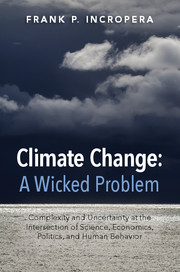 Climate Change: A Wicked Problem
Climate Change: A Wicked Problem Published online by Cambridge University Press: 05 October 2015
We can't engage in a serious examination of climate change without considering its strong ties to energy. More than any other factor, anthropogenic contributions to climate depend on how energy is produced and used.
Over his illustrious career, Richard Smalley (1943–2005), a Nobel Laureate and pioneer in the field of nanoscience and technology, was invited to give many lectures on his work. However, in the last few years of his life, he felt compelled to use the lectures as a vehicle for sharing his concerns about the world's energy future. In one of his slides he presented his views on humanity's top ten problems of the next fifty years. His list included food, water, the environment, poverty, war, disease, education, democracy, and population. While we might attach different weights to the significance of each concern, we would probably agree that all are to be taken seriously. However, for Smalley, there was no equivocation on what belonged at the top of the list. Meeting the world's energy needs was paramount and linked, to varying degree, with the other nine.
Energy: an indispensable resource
It would be difficult to overstate the importance of energy to the well-being of humankind. It is the resource that sustains all life and economic activity. It enables the production and distribution of all manner of goods and services, as well as human mobility on the ground and in the air. It is absolutely essential to achieving an acceptable standard of living, and in the words of Paul Roberts (2004, p. 6), “Access to energy has emerged as the overwhelming imperative of the twenty-first century.”
While preindustrial societies functioned entirely on energy derived from the Sun, the Industrial Revolution marked a transition to the use of fossil fuels and by the mid-twentieth century to nuclear energy. It is difficult to appreciate the enormity of today's global energy supply chain. In 2013, humankind consumed approximately 505 quadrillion (505,000 trillion) British thermal units (Btu) of energy, or simply 505 quads (BP, 2014a). The amount is staggering, and trillions of dollars are spent annually to produce and distribute this energy.
To save this book to your Kindle, first ensure [email protected] is added to your Approved Personal Document E-mail List under your Personal Document Settings on the Manage Your Content and Devices page of your Amazon account. Then enter the ‘name’ part of your Kindle email address below. Find out more about saving to your Kindle.
Note you can select to save to either the @free.kindle.com or @kindle.com variations. ‘@free.kindle.com’ emails are free but can only be saved to your device when it is connected to wi-fi. ‘@kindle.com’ emails can be delivered even when you are not connected to wi-fi, but note that service fees apply.
Find out more about the Kindle Personal Document Service.
To save content items to your account, please confirm that you agree to abide by our usage policies. If this is the first time you use this feature, you will be asked to authorise Cambridge Core to connect with your account. Find out more about saving content to Dropbox.
To save content items to your account, please confirm that you agree to abide by our usage policies. If this is the first time you use this feature, you will be asked to authorise Cambridge Core to connect with your account. Find out more about saving content to Google Drive.